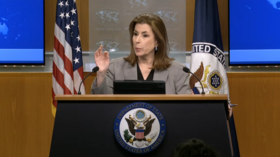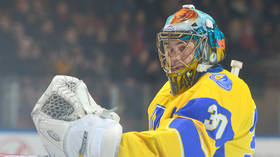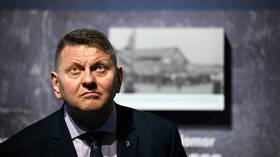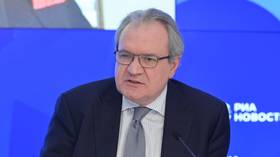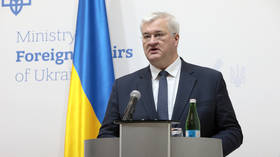US investigation into ‘Russian meddling’ in the EU will be a farce
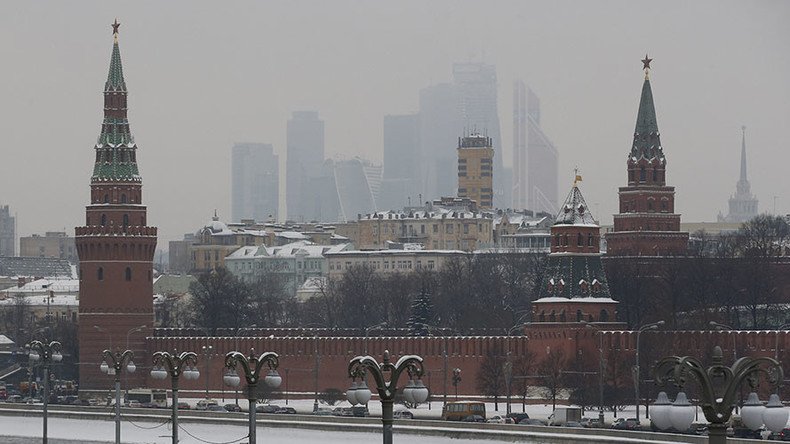
News broke last Saturday evening that the United States is to conduct a “major investigation” into how the Kremlin is “infiltrating political parties in Europe” amid “mounting concerns” of a new Cold War.
The exclusive, which was published by the UK’s Telegraph newspaper, revealed that James Clapper, the US Director of National Intelligence has been instructed by Congress to begin the major review into Russia’s “clandestine” funding of EU parties over the last decade.
Hypocritical? Oh, let us count the ways…
“Moscow-backed destabilization” of Europe
First, to get a sense of the motives behind this investigation, look no further than the wording used to justify it. The Russians have been “fostering agitation against NATO missile defense” and attempting to “exploit European disunity” on the subject.
That’s right everyone, the way to deal with European “disunity” over NATO, is not to address the root causes — it’s to start investigating how the Russians might be exploiting it. In a roundabout way, that makes sense as a temporary distraction. But realistically, Washington may be giving the Russians a bit too much credit. This so-called “Moscow-backed destabilization” should be the least of their worries. In actual fact, there are plenty of reasons for Europeans to have grown naturally disillusioned with the military bloc all on their own: a massive refugee crisis, the threat of the Schengen agreement crumbling before their eyes, terrorism paying more frequent visits to Europe’s foremost cities — not to mention growing concerns over potential repeats of the mass sexual assaults seen in Cologne on New Year’s Eve.
In other words, years of NATO interventionism have stirred up a toxic political cocktail and dropped it off on Europe’s doorstep — and that, frankly, has very little to do with Russia.
Look who cares — and who doesn’t
Young as it is, the investigation into the Kremlin’s “meddling” has already scored some big fans.
“Finally waking up to the problem,” tweeted Bill Browder along with a link to the Telegraph story. Banker-turned-activist Browder was convicted of a massive tax fraud scheme in Russia (and has subsequently turned into somewhat of a hero in the Western media, despite the emergence of holes in his story and his interesting preference for speaking to an adoring press rather than under oath).
Anders Aslund, senior fellow at the Atlantic Council also tweeted the story. Aslund’s tweets are interesting, to say the least. In November, he suggested on the platform that the “broader implication” of a Reuter’s investigation into the identity of Putin’s daughters meant that one of those alleged daughters, Ekaterina Tikhonova, would be a “successor” to her father, thus renewing a Russian “monarchy”.
And such good news deserves to be tweeted thrice, seems to have been the thinking for Jacek Saryusz-Wolski, Polish MEP and Vice President of the European People’s Party.
On the other hand, a lot of the reader reaction on the story was quite different. One Twitter user posted the link and asked: “When do we investigate US meddling, globally?” while one noted “several levels of irony” in the news, and another warned that merely talking about ending NATO in Europe could soon earn you the honor of being labeled part of a “Moscow-backed destabilization program”. On Facebook, the comment on the story which received the most ‘likes’ simply said: “Please investigate US meddling in Europe first.”
If you talk about ending NATO, you could soon be called being part of a "Moscow-backed destabilisation" program https://t.co/LQlBcBniWq
— Tilo Jung (@TiloJung) January 17, 2016It’s only democracy if you agree with us
How, pray tell, would Washington and Brussels react if tomorrow Moscow announced a ‘massive investigation’ into alleged US-funding of opposition figures and parties in Russia — an investigation designed purely to stigmatize the opposition and paint them as foreign agents. Oh wait; we already know how they would react. They would scream blue murder about Putin’s ‘punitive’ and ‘authoritarian’ regime that seeks to silence dissidents and opposition figures. The headlines practically write themselves.
The message is clear and the double standard could not be more obvious: Decades of US influence in the EU is inherently good and acceptable, while any modicum of Russian influence is awful and must be stamped out. In Europe, democracy is only democracy when pro-EU, pro-NATO parties win elections — but it’s “destabilization” and undermining “political cohesion” when anti-establishment parties and politicians gain traction.
Neo-McCarthyism kicked up a notch
Why the EU can’t conduct this investigation itself is not made clear in the Telegraph piece, but one could venture a guess that it’s because what’s happening here has little to do with EU interests. It’s US intelligence — with permission from Brussels — nosing around in the European democratic process in an effort to identify and weed out parties and political figures that hurt Washington’s interests. Sounds a bit like what they’re accusing the Russians of doing, only worse.
But why should we be surprised? Something similar has already happened within the media and academia. Journalists, analysts and historians who have attempted to rationalize or explain Russia’s actions from Ukraine to Syria have been labeled agents of the Kremlin and have been pushed to the fringes for having the audacity to go against the accepted consensus. This investigation in large part will simply be an extension of that blossoming neo-McCarthyism. We’re just moving on from individual journalists and politicians to stigmatizing entire political parties.
Already in the UK, Labour leader Jeremy Corbyn, for the sin of suggesting he would not use nuclear weapons and his reluctance to dive head-first into conflict with Russia, has already been labeled ‘Comrade Corbyn’ by the Daily Mail, while his director of communications, acclaimed journalist Seumas Milne, has been branded a ‘Stalinist’ by Politico.
RT gets name-checked again
What would a story about an investigation into Russian meddling in Europe be without a mention of Russia Today? Analysts have noted that RT, the “Kremlin-controlled television channel, which operates in Britain” (gasp) gave “very positive and extensive” coverage to Corbyn during his leadership campaign. This naturally is cited as part of the Kremlin’s nefarious campaign of influence in the UK elections. No mention is made, however, of the brutal anti-Corbyn campaign waged by the majority of the UK establishment media for months in the run up to his election. In this context, the fact that RT gave Corbyn some positive attention is hardly earth-shattering stuff.
But again, we’ve come smack-bang into another case of hypocritical nonsense. Western media treats the Russian opposition like it’s the Second Coming of Jesus — and yet we’re all supposed to get our pants in a twist over Russian media taking an interest in anti-NATO candidates in Europe? In Western capitals, the red carpet is rolled out for anyone with a Russian passport and something remotely anti-Putin to say. Criminal background? No matter. History of racist comments? Don’t worry about it. Fan of museum orgies? It’s all good. Like to set historic buildings on fire? Go ahead; you’re an ‘artist’.
Europe’s crisis of leadership
The Telegraph story hasn’t been covered widely since it broke at the weekend, but rest assured of the coming onslaught — and remember that the analysts overjoyed by the prospect of another excuse to divert all blame east, are the same ones that never bothered to worry about the decades-long US-backed destabilization of the Middle East, which, it’s fair to say, is proving to be a far bigger problem for Europe than Putin and RT.
Europe is going through a crisis of leadership — and the current crew steering the ship are still blind to the fact that their passengers are beginning to look longingly out at the waves wondering whether it might not be better to just jump overboard and see what happens. In Britain, the threat of a ‘Brexit’ looms as a very real possibility. Poland’s newly-elected nationalist government doesn’t appear ready to play ball with Brussels. Spain has elected a ‘hung’ parliament. Far right and far left movements are gaining ground in Germany and France. Greece is barely holding on and a question mark remains hanging over the future of the euro.
But the real problem is obviously Putin’s meddling. Yeah, let’s just go with that.
The statements, views and opinions expressed in this column are solely those of the author and do not necessarily represent those of RT.




